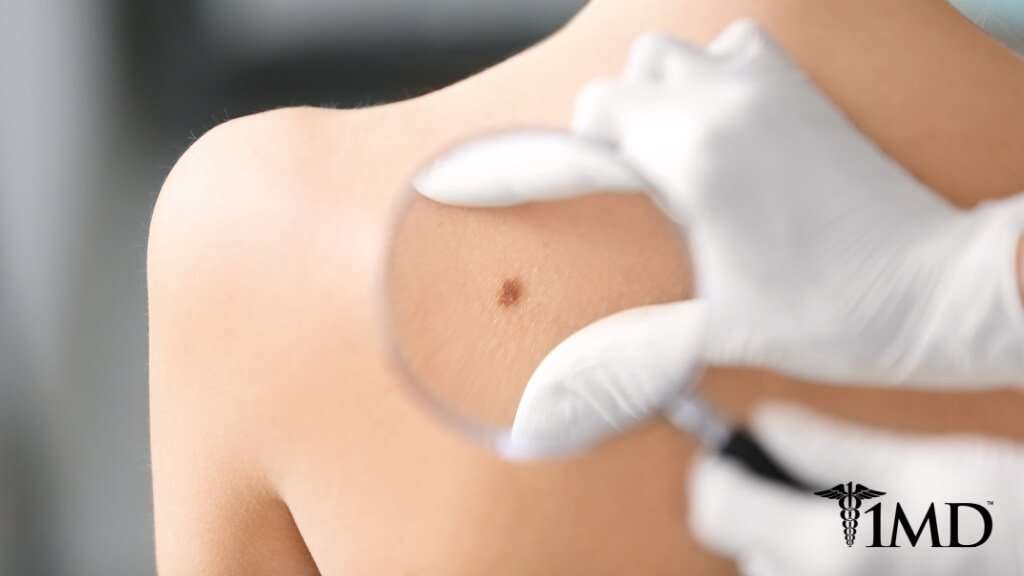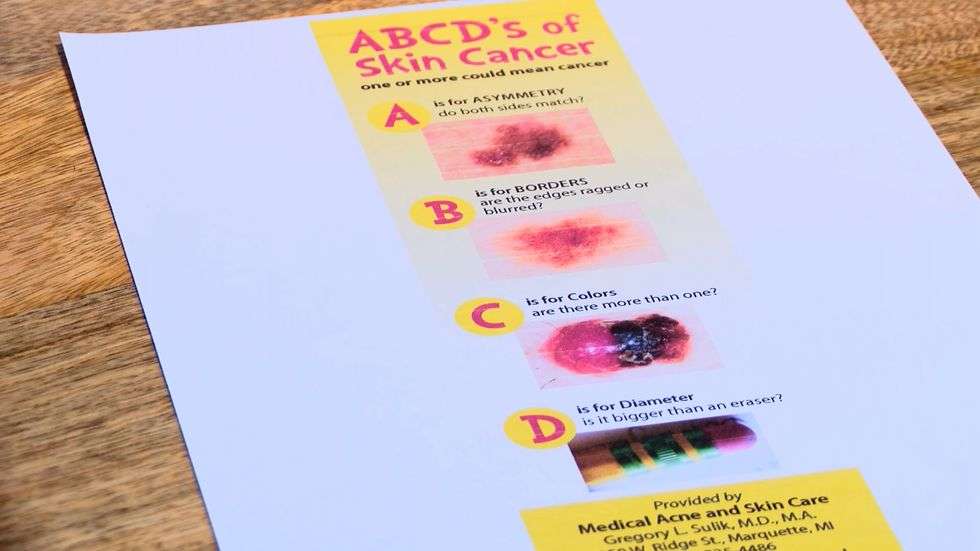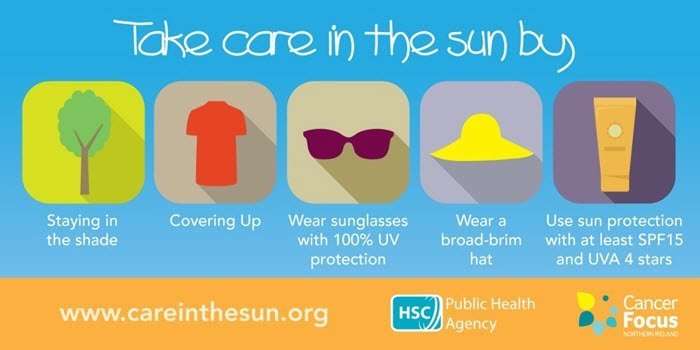Is Skin Cancer Connected To Genetics
In rare circumstances, genetics can also play a role in your skin cancer likelihood.
Notably, around 1 in every 10 patients diagnosed with skin cancer will also have a family member with the disease. Compared to people with no history of melanoma in their family, each person with a first-degree relative with the condition has a higher likelihood of developing the disease.
When someone is diagnosed with melanoma, doctors often recommend close relatives be examined too. If you know someone in your family who has had skin cancer, it might be worth learning more about your genetics, and the risks youre exposed to, with a DNA test.
Theres even a specific kind of genetic melanoma, called Familial Atypical Multiple Mole Melanoma Syndrome. This basically means if you have a history of skin cancer in your family and a lot of atypical moles, then youre more likely to get skin cancer.
In the case of some familial cases of skin cancer, researchers have even discovered DNA changes in tumour suppressor genes like BAP1 and CDKN2A, which prevent the genes from doing the regular job of controlling cell growth and protecting cells.
Precautions To Be Taken Before Using Natural Home Remedies:
Yes, they are several precautions that need to taken by you before you use the below-suggested techniques. It is strictly advised that you first get your lesion/sore checked out by a dermatologist. Firstly, you may not know what kind of lesion you are self-treating. Trying to identify this lesion by yourself and categorizing could be a gargantuan task!
They are several symptoms and signs of the lesion belonging to one of the above-stated types of cancer, however, skin cancer lesions can present unusual features which baffle dermatologists.Using their tools like a magnifying glass and handheld imaging devices they are still sometimes not so sure. The only medical method to identify skin cancer is to send the tissue from the site to a biopsy.
Secondly, you might waste your precious time figuring out what kind of skin cancer youve got, the disease might gain the upper hand here. Delaying any treatment, i.e. conventional or traditional will only lead to you worsening the condition. Of the three significant cancers, melanoma spreads on a rapid rate. If you dont have any time to identify what kind of cancer youve got. It is very strongly recommended that you visit your dermatologist when you develop these symptoms.
Recommended Reading: What Are The Chances Of Getting Skin Cancer
Other Strategies That Help
In addition to all-important sunscreen use, there are a few ways to help your body sidestep the suns assault and boost your skins self-healing ability.
The Mediterranean diet: This way of eatingrich in fruits, vegetables, fish, grains, nuts, olive oil, and very little meatisnt just a way to improve heart health. It may also help prevent skin cancer. In a 2019 study published in the American Journal of Clinical Nutrition, French women who followed this diet had a 28 percent reduced risk of melanoma and a 23 percent lower risk of basal cell carcinoma.
Retinoid creams: Derived from vitamin A, they can be found in over-the-counter and prescription products. Topical retinoids are well-studied and well-understood, with proven pathways leading to sun damage reversal, says Joel L. Cohen, M.D., a dermatologist in Denver. They help decrease some of the enzymes that cause collagen to break down, and they actually help produce collagen in the dermis, the skins middle layer.
Lasers: There are at least three lasers that are not only approved for resurfacing skin and improving wrinkles but are also FDA-cleared for treating precancerous lesions called actinic keratosis, Cohen says. Treating these precancerous lesions will hopefully translate to fewer taking the next step and in some cases developing into squamous cell carcinoma.
Also Check: How To Treat Melanoma In Nails
Avoid Weakening Your Immune System
Having a weakened immune system increases your risk of getting melanoma and other types of skin cancer.
Infection with HIV, the virus that causes AIDS, can weaken the immune system. Avoiding known risk factors for HIV infection, such as intravenous drug use and having unprotected sex with many partners, might lower your risk of skin cancer and many other types of cancer.
Some people need to take medicines to suppress their immune system. This includes people who have had organ transplants and some people with autoimmune diseases. People with cancer also sometimes need to take medicines such as chemotherapy that can lower their immune function. For these people, the benefit from taking these medicines will likely far outweigh the small increased risk of getting skin cancer.
How The Sun Harms Your Eyes

UV radiation can cause other serious eye conditions including:
Cataracts:;The most common cause of treatable blindness,;cataracts cloud and yellow the lens of your eye, causing progressive vision loss.
Macular degeneration:;A major cause of vision loss for people over age 60, macular degeneration is caused by cumulative UV damage to the central portion of the retina, the back layer inside each eye that records what we see and sends it to your brain.
Keratitis, or corneal sunburn: UV exposure can cause painful burning of the cornea, the clear surface that admits light and images to the retina. Also known as snowblindness, this condition occurs in skiers and hikers because of the suns intensity at altitudes and its reflective nature off of water, snow and ice.
Conjunctival cancers:;Once rare, these eye cancers are increasing, especially among older people.
About Ocular Melanoma
While rare, ocular melanoma is the most common eye cancerin adults. Unlike melanomas that occur on the skin, ocularmelanomas have no known association with UV rays.
Read Also: What Are The Chances Of Getting Skin Cancer
Avoid Using Tanning Beds And Sunlamps
Many people believe the UV rays of tanning beds are harmless. This is not true. Tanning lamps give off UV rays, which can cause long-term skin damage and can contribute to skin cancer. Tanning bed use has been linked with an increased risk of melanoma, especially if it is started before a person is 30. Most dermatologists and health organizations recommend not using tanning beds and sun lamps.
Why Not To Leave Skin Cancer Untreated
Skin cancer has two sides. On the one hand, it is fairly easy to detect and treat when done so at an early stage. On the other hand, when left untreated, skin cancer can cause disfigurement and even death. This is the dark side of skin cancer. Find out the sobering consequences of allowing skin cancer to develop into later stages.
Don’t Miss: When Squamous Cell Carcinoma Spreads
How Much Sunscreen Should I Use
To get the full broad-spectrum protection out of your sunscreen, apply one ounce about a shot glass full to your entire body. Most people apply less than half of that amount, translating into reduced protection. Learn more.
With reapplication, a family of four should use one four-ounce bottle of sunscreen per person during a long day outdoors.
Where Should I Apply Sunscreen
Experts recommend applying sunscreen to your entire body before you dress for the day. That way your skin will be protected if your clothing shifts or you remove layers. At the very least, you should use sunscreen on every part of your body that is exposed to the sun, including those easy-to-miss spots: the tops of your ears, back of your neck, your scalp , tops of your feet and behind your knees.
You May Like: What Is Non Small Cell Carcinoma
Protect Yourself From The Sun
Spending time in the sun can be healthy, but only if you know how to protect yourself.
Wearing sunscreen and other forms of sun protection are essential. If youre going to be in direct sunlight, its best to choose sunscreen with an SPF of at least 50. Heres a tip for those who burn easily: choose a higher SPF for better coverage.
If you want to prevent possible health risks associated with sun exposure, its important to choose a broad-spectrum sunscreen this is something that can protect you from both UVA and UVB rays. The UVA rays of the sun have longer wavelengths, while UVB rays are shorter, but can cause burns, age spots, and even a higher chance of wrinkles.
Reapply your sun protection every 2 hours, or more often if you get wet. Besides that, keep an eye on the expiry date sunscreen does expire.
Questions About Skin Cancer Risk Factors And Prevention
How can I reduce my risk of getting skin cancer?
Exposure to UV radiation;is the primary cause of cell damage that may lead to skin cancer. One important way to reduce your risk of skin cancer is to avoid sun exposure;when possible and/or protect yourself from damaging rays. Consider following these tips:
What is ultraviolet radiation?
UV radiation is among several types of light emitted by the sun. Itâs also a carcinogen. Most of the UV light that reaches the earth is UVA, the long-wave ultraviolet rays that penetrate the skin more deeply than UVB rays. These strong rays can reach the skins deepest layers, where melanocytes are located. Melanocytes absorb UVA, producing the pigment melanin, which darkens the skin. But too much UVA may damage melanocytes, potentially causing melanoma. UVB rays are not nearly as prevalent or potent, but they may burn the outer layers of skin.
How do I examine myself for skin cancer?
Donât Miss: Is Melanoma The Same As Skin Cancer
Also Check: What Are The Risk Factors Of Basal Cell Carcinoma
Can I Use A Sunscreen With A Low Spf If I Don’t Burn Very Often
If you were only trying to avoid sunburn, the answer would be “yes.” But protection from sunburn is not the most important reason for wearing sunscreen. You want to reduce damage from the sun. Your skin can be harmed by constant sun exposure, whether or not you see a burn. Remember, sunburn is an immediate reaction, but damage from the sun occurs over a lifetime. If you have had skin cancer or pre-cancer, you should use an SPF of 30 or higher.
Use Sunscreen With Spf 15 Or Higher

Use sunscreen with both UVA and UVB protection, also called broad spectrum sunscreen. Check the expiration date on the bottle to make sure its not out of date.
To get the most protection:
- Wear sunscreen even on cloudy days UV rays can still harm your skin when it’s cloudy outside
- Put sunscreen on 30 minutes before you go outside and put on more sunscreen every 2 hours and after you swim or sweat
- Be sure to use enough sunscreen youll need about a handful to cover your body
- Remember to apply sunscreen to your ears, hands, feet, the back of your neck, and any part of your scalp that isnt covered by hair
- Use lip balm with sunscreen in it to protect your lips
- If you wear very lightweight or loosely woven clothing , put sunscreen on under your clothes
Read Also: What Is Squamous Cell Carcinoma Of The Head And Neck
Ways To Protect Yourself From Skin Cancer
Skin cancer in the past couple of years reaches the top of the list of diseases that cause death. Particularly it is a matter of malignant melanoma, as the most dangerous type of skin cancer.;Every year, the lives of more than 10.000 Americans depend on this type of cancer.
If you take measures for active protection from sunburn, we can say that you have reduced the possibility for emergence of malignant melanoma.
Lymph Node Biopsy And Removal
A lymph node biopsy is frequently performed on melanoma patients. In this procedure, your doctor will remove one or more specific lymph nodes, known as sentinel lymph nodes, which directly receive the lymph fluid draining from the tumor. If no sign of cancer is found in the lymph node or nodes, no additional lymph node surgery is necessary. If melanoma cells are found in one or more sentinel lymph nodes, the remaining lymph nodes in the region may be removed.
Read Also: What Is The Main Cause Of Skin Cancer
Recommended Reading: Is Skin Cancer Usually Raised
Who Should Use Sunscreen
The short answer is everyone! Men, women and children over 6 months of age should use sunscreen every day. This includes people who tan easily and those who dont remember, your skin is damaged by sun exposure over your lifetime, whether or not you burn.
Babies under the age of 6 months are the only exceptions; their skin is highly sensitive. Stay out of the sun; shade structures and sun-protective clothing are the best ways to safeguard infants.
Does The Sun Have Benefits
You may have been taught that you need sunlight for your body to make vitamin D, because vitamin D is not found naturally in most foods. But today, many foods are fortified with vitamin D during the manufacturing process. Thus, sun exposure is not as important for the body’s vitamin D supply as it used to be. Of course, being outdoors makes most people feel good. And playing tennis is better for your health than watching television. But you can still protect yourself from the sun’s damaging effects while enjoying yourself outdoors.
Also Check: What Does Advanced Skin Cancer Look Like
Start Your Care With A Fellowship
This may seem like a no-brainer, but when it comes to skin cancer treatment, youre better off beginning your care with a board-certified dermatologist. Choosing a dermatologist with fellowship training in skin oncology and dermatologic surgery is also important.
Sometimes people go right to a plastic surgeon when they have something on their face, Dr. Lee explains. But skin cancer can grow wider than anticipated, making complete removal tricky.
One way to ensure that you get the best cosmetic outcome is to seek out a dermatologist with experience in treating facial skin cancer. Dermatologists who have completed a dermatologic surgery fellowship tend to have the most experience with facial cancers, Dr. Lee says. Ask your dermatologist for a referral to a dermatologic surgeon or seek treatment at a medical center with dermatologic surgeons on staff.
Fellowship-trained dermatologic surgeons are experts in delicate skin-sparing procedures that can better preserve your appearance while also making sure that all of the cancer is removed. They are also skilled in reading pathology, Dr. Lee points out, which gives them an excellent understanding of how cancer grows so they can ensure that they are removing all of it.
And if you do need a plastic surgeon, a dermatologic surgeon will be able to advise you. ;
In The Morning To 4 In The Afternoon
This is typically the time of day when the suns rays are at their strongest and can do the most damage. Expecting people to stay indoors during this timeframe is obviously not practical, but you can be extra cautious during these hours.
If youre going to be outside during this time, try to stay in the shade or cover your body so less sun reaches your skin. And obviously, sunscreen is your friend whenever youre outdoors, even if youre covered or in the shade.
When shopping for sunscreen, however, it is important to buy a mineral-based one and not a chemical one. Chemical-based sunscreens may be cheaper, but they break down quickly, thus entering the body and potentially disrupting hormones.
Otherwise, if you can schedule your outside chores, your daily walk, a sporting event, and other things you like to do outside to either before 10 am or after 4 pm, you might be saving your skin.
Also Check: How Bad Is Melanoma Skin Cancer
Chaparral For Skin Cancer Treatment
Chaparral is a less known herb that is utilized by naturopaths for a considerable length of time to treat skin cancer. Weaken the tincture with water and apply it on the influenced territories. This herb contains anti-incendiary and antioxidant flavonoids. These mixes help in wiping out free radicals that assistance in the development and spreading of the tumor.
Preventive Measures for Skin Cancer Treatment:
As the idiom goes, aversion is superior to cure. Along these lines, it is better to protect your skin from cancer as opposed to torment later. Taking after being a portion of the preventive measures you can take up at this moment:
- Abstain from tanning however much as could reasonably be expected.
- Amid hot summer, wear since a long time ago sleeved dresses and abstain from going out between 10 am and 4 pm.
- Use sunscreen cream to protect yourself from the destructive beams of the sun.
- Utilize an expansive range sunscreen of SPF 30 or higher at whatever point you go outside.
- Regardless of depending on home remedies, it is best to stay in contact with a specialist. Likewise, continue testing for indications of change.
- TAGS
Products For Protection And Recovery

- Anthelios from La Roche-Posay contains titanium dioxide and offers SPF 50.
- Beautycounter CounterSun Daily Sheer Defence For Face contains zinc oxide with SPF 25.
- Clarins has relaunched After Sun, a soothing balm enriched with antioxidants that help minimize the feeling of sunburn.
- Soke is a multi-peptide treatment mask that can diminish the appearance of blotches and fine lines on the décolleté area, where the dermis is thinner and more prone to wrinkling.
- Visit the Canadian Dermatology Association at dermatology.ca for approved products in their sun protection program.
Recommended Reading: What Does Early Squamous Skin Cancer Look Like
Take Note Of Your Medications
If you’re taking medications that increase the skin’s sensitivity to the sun, such as antibiotics, blood pressure medications, or anti-inflammatories, you should avoid;sun;exposure altogether. Topical creams and serums that contain ingredients like retinol or AHA can also increase sun sensitivity, which increasesyour risk of skin damage, potentially leading to cancer. You can take extra precautions by wearing a broad-brimmed hat, sunglasses,;and long-sleeved clothing with a UPF rating .;